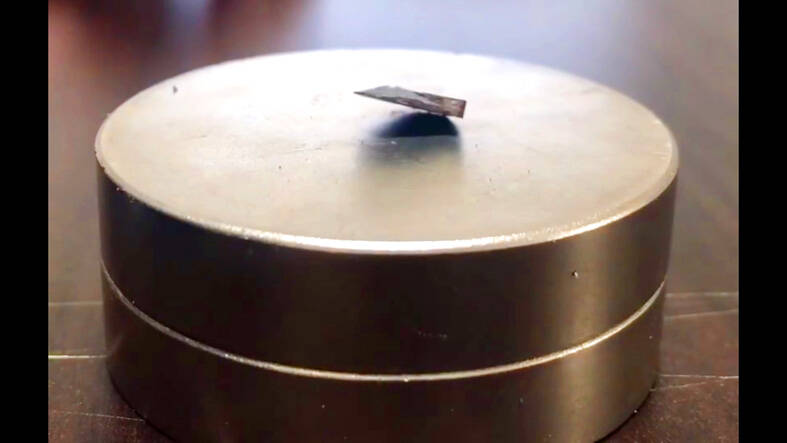South Korean experts have created a committee to verify claims about a potential breakthrough in superconductor technology that has been driving both excitement and controversy among markets and industry participants.
The Korean Society of Superconductivity and Cryogenics (KSSC) asked the Quantum Energy Research Centre to submit samples that are required in the verification process of room-temperature superconductors, the institution said in a statement on Wednesday.
“The claim of a room temperature superconductor discovery is causing a great controversy at home and abroad, but we are concerned about the situation in which unverified claims are being poured out by fellow researchers without an entity responsible for verifying it,” said the KSSC, which consists of professors and experts.

Photo: screen grab from the Web site of ScienceCast
Papers published on July 22 showed researchers at the Quantum Energy Research Centre and other South Korean experts synthesized the world’s first superconductor known as LK-99 that is capable of conducting electricity at room temperature with ambient pressure.
Excitement grew further after a video of a team of Chinese scientists replicating the South Korean team’s findings went viral.
The KSSC said it is difficult to say if the material is a room-temperature superconductor at this point, based on the archived papers and published videos.
Research institutes of KSSC members are to conduct cross verification if the Quantum Energy Research Centre provides samples, the statement said.
The verification committee is to be led by Kim Chang-young, a Seoul National University professor who is an expert in a related field.
“If it is verified, it will be a groundbreaking research result that will have a great impact on science and technology. However, it is worrisome that this verification is being disclosed without academic review, and that it is having economic and social impacts,” the KSSC said.
Meanwhile, investors continued to pile into some South Korean stocks seen as related to superconductors, even as the stock exchange warned of speculative bets and unfair trades.
Korea Exchange late on Wednesday asked investors to be wary before investing in Duksung Co, Mobiis Co and Shinsung Delta Tech Co.
“Investors should be cautious on increased volatility in these superconductor theme stocks as their substance is not clear,” Kiwoom Securities Co analyst Han Ji-young said.

MULTIFACETED: A task force has analyzed possible scenarios and created responses to assist domestic industries in dealing with US tariffs, the economics minister said The Executive Yuan is tomorrow to announce countermeasures to US President Donald Trump’s planned reciprocal tariffs, although the details of the plan would not be made public until Monday next week, Minister of Economic Affairs J.W. Kuo (郭智輝) said yesterday. The Cabinet established an economic and trade task force in November last year to deal with US trade and tariff related issues, Kuo told reporters outside the legislature in Taipei. The task force has been analyzing and evaluating all kinds of scenarios to identify suitable responses and determine how best to assist domestic industries in managing the effects of Trump’s tariffs, he

TIGHT-LIPPED: UMC said it had no merger plans at the moment, after Nikkei Asia reported that the firm and GlobalFoundries were considering restarting merger talks United Microelectronics Corp (UMC, 聯電), the world’s No. 4 contract chipmaker, yesterday launched a new US$5 billion 12-inch chip factory in Singapore as part of its latest effort to diversify its manufacturing footprint amid growing geopolitical risks. The new factory, adjacent to UMC’s existing Singapore fab in the Pasir Res Wafer Fab Park, is scheduled to enter volume production next year, utilizing mature 22-nanometer and 28-nanometer process technologies, UMC said in a statement. The company plans to invest US$5 billion during the first phase of the new fab, which would have an installed capacity of 30,000 12-inch wafers per month, it said. The

Taiwan’s official purchasing managers’ index (PMI) last month rose 0.2 percentage points to 54.2, in a second consecutive month of expansion, thanks to front-loading demand intended to avoid potential US tariff hikes, the Chung-Hua Institution for Economic Research (CIER, 中華經濟研究院) said yesterday. While short-term demand appeared robust, uncertainties rose due to US President Donald Trump’s unpredictable trade policy, CIER president Lien Hsien-ming (連賢明) told a news conference in Taipei. Taiwan’s economy this year would be characterized by high-level fluctuations and the volatility would be wilder than most expect, Lien said Demand for electronics, particularly semiconductors, continues to benefit from US technology giants’ effort

‘SWASTICAR’: Tesla CEO Elon Musk’s close association with Donald Trump has prompted opponents to brand him a ‘Nazi’ and resulted in a dramatic drop in sales Demonstrators descended on Tesla Inc dealerships across the US, and in Europe and Canada on Saturday to protest company chief Elon Musk, who has amassed extraordinary power as a top adviser to US President Donald Trump. Waving signs with messages such as “Musk is stealing our money” and “Reclaim our country,” the protests largely took place peacefully following fiery episodes of vandalism on Tesla vehicles, dealerships and other facilities in recent weeks that US officials have denounced as terrorism. Hundreds rallied on Saturday outside the Tesla dealership in Manhattan. Some blasted Musk, the world’s richest man, while others demanded the shuttering of his